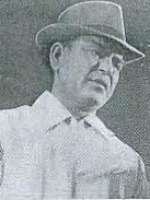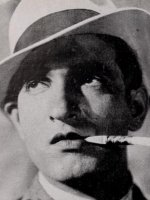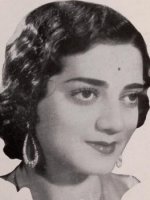Bibbo is a Actor born on 1 january 1906

Bibbo (1906–1972) was singer-actress working in Hindu/Urdu films. She acted in Indian cinema from 1933-1947 before moving to Pakistan following Partition of India in 1947. She started her acting career with Ajanta Cinetone Ltd. in 1933, working with directors like M. D. Bhavnani and A. P. Kapoor. She was one of the top leading ladies of the 1930s along with actresses like Devika Rani, Durga Khote, Sulochana (Ruby Myers), Mehtab, Shanta Apte, Sabita Devi, Leela Desai and Naseem Banu. She was referred to as "one of the most important female stars of the 1930s and 1940s". Her fame had her featured in the lyrics of a popular song from the film Garib Ke Lal (1939) sung by Mirza Musharraf and Kamla Karnataki, with music by Sageer Asif and lyrics by Rafi Kashmir. "Tujhe Bibbo Kahoon Ke Sulochana" (Should I call you Bibbo or Sulochana), where Sulochana (Ruby Myers) referred to another popular actress of the time. This was the first time a song featuring famous actors was used in the lyrics of a film song.
Bibbo became the first female music composer of Indian cinema, when she composed the music for Adal-e-Jahangir in 1934, a year before Jaddanbai, mother of actress Nargis, composed music for Talash-e-Haq (1935). She was also the music director for a second film called Qazzak Ki Ladki (1937).
She worked with actors like Master Nissar, Surendra and Kumar. She formed a popular working relationship with them. Her pairing with Surendra was especially well-liked with the pair giving several hits like Manmohan (1936), Jagirdar (1937), Gramaphone Singer (1938), Dynamite (1938) and Ladies Only (1939). Her first film was Rangila Rajput followed by Mayajaal, both in 1933. She worked in nearly thirty films as a lead actress in India from 1933-47, shifting to character roles in later years, following her move to Pakistan. She won the Nigar Award for the best character actress for her role in the Pakistani film Zehr-e-Ishq (1958).
The last days of Bibbo's life are claimed to have been lonely with her life described as being "miserable and poverty stricken". She died on 25 May 1972.
Source : Wikidata
Bibbo

- Infos
- Photos
- Best films
- Family
- Characters
- Awards
Birth name Ishrat Sultana
Birth 1 january 1906
Death 1 january 1972 (at 66 years)
Birth 1 january 1906
Death 1 january 1972 (at 66 years)
Bibbo became the first female music composer of Indian cinema, when she composed the music for Adal-e-Jahangir in 1934, a year before Jaddanbai, mother of actress Nargis, composed music for Talash-e-Haq (1935). She was also the music director for a second film called Qazzak Ki Ladki (1937).
She worked with actors like Master Nissar, Surendra and Kumar. She formed a popular working relationship with them. Her pairing with Surendra was especially well-liked with the pair giving several hits like Manmohan (1936), Jagirdar (1937), Gramaphone Singer (1938), Dynamite (1938) and Ladies Only (1939). Her first film was Rangila Rajput followed by Mayajaal, both in 1933. She worked in nearly thirty films as a lead actress in India from 1933-47, shifting to character roles in later years, following her move to Pakistan. She won the Nigar Award for the best character actress for her role in the Pakistani film Zehr-e-Ishq (1958).
Biography
Bibbo was married by the end of 1930s to Khalil Sardar, who directed her in Adal-e-Jahangir for which she gave music. Following the marriage they left Bombay and moved to Lahore, where they produced a film under the banner of Rainbow films, Qazzak Ki Ladki (1937), where she was also the music director. The film was a commercial failure and Bibbo finally returned to Bombay. Following Partition in 1947, Bibbo moved to Pakistan, where she worked as a character artiste. According to Zulqarnain Shahid (The Weekly MAG, Pakistan) re-published in Cineplot, it was stated that Bibbo was married to Shahnawaz Bhutto, Zulfiqar Ali Bhutto's father. In the June 1943 issue of Filmindia, Baburao Patel answered a query about Bibbo claiming she was "indeed married to Bhutto".The last days of Bibbo's life are claimed to have been lonely with her life described as being "miserable and poverty stricken". She died on 25 May 1972.
Usually with
Filmography of Bibbo (6 films)
Actor

Sneh Bandhan (1940)
Actors Bibbo
Roles Snehlata
Snehlata lives with her postmaster father and is in love with Gopal who is poor but well-educated. Sneha's mother is not happy with Gopal as she wants Sneha to marry a rich man. Agreeing to wait for a year, Gopal goes to the city to make money. A year passes, but as Gopal has not returned at the stipulated time, Sneha is married off to the rich Pratap who loves her. Sneha is still pining for Gopal and a dissapointed Pratap takes to drinks. When Gopal comes to visit Sneha, Pratap in a jealous rage kills him. Sneha takes the blame and is jailed for ten years.
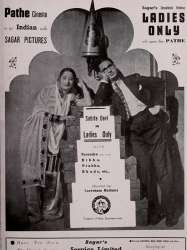
Ladies Only (1938)
, 2h38Actors Sabita Devi, Surendra, Bibbo
Three girls from different regions of India, Sabita Devi (Gujarat), Bibbo (Punjab) and Prabha (Bengal) meet at a railway station. With no place to stay they decide to find accommodation together. A cook (Bhudo Advani) joins them speaking the language from each state. A young crook (Surendra) enters their life and trouble starts brewing between the girls when they all fall in love with him.
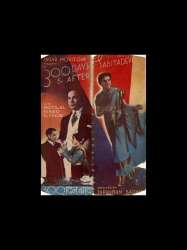
Teen Sau Din Ke Baad (1938)
, 2h38Genres Adventure
Actors Motilal, Yakub, Sabita Devi, Bibbo
Sudhir (Motilal), a young millionaire is leading a dissipated life indulging in drinks, gambling and women due to sheer boredom. His health starts fading and after one such bout he faints. The doctor admonishes him regarding his life-style. He advises him against his fast life and suggests that he take to some physical labour, which the doctor is sure Sudhir will not be able to do. Sudhir takes up the challenge and decides to give up his home for three hundred days and live without using his wealth. He sets out into the world with nothing in his pocket. The challenges he faces and how he overcomes them are interspersed with a lot of humour and hard work as he tries to make a living. He finally ends up working in a soap factory where he falls in love with the typist Sharda (Sabita Devi). The boss Lakshmidas has a wife Ramola (Bibbo), who is attracted to Sudhir. When the boss faces problems with the factory, Sudhir anonymously sends money to help him out. Eventually the three hundred days are over, Sudhir now a healthy young man has won his bet with the doctor and a wife for himself.

Jagirdar (1936)
, 2h46Directed by Mehboob Khan
Actors Yakub, Bibbo, Surendra, Motilal, Ramchandra Purushottam Marathe
Roles Neela
Neela (Bibbo) and Jagirdar (Surendra) marry each other without anyone’s knowledge. However, Jagirdar goes missing at sea presumed dead. Neela realises she’s pregnant and when the child is born he’s called illegitimate. Shripat (Pande), a poor farmer marries her and helps take care of her son Ramesh. On his return Jagirdar is angry to find Neela married to Shripat and a fight ensues. When Shripat is killed by Banwarilal everyone assumes Jagirdar is the murderer. Soon with Ramesh’s help they fight the villains with the truth revealed. Ramesh finally accepts Jagirdar as his father.

Manmohan (1935)
, 2h27Directed by Mehboob Khan
Actors Yakub, Bibbo, Surendra
Roles Vimala
Ashok (Surendra) is an artist in love with Vimala (Bibbo). On learning that she is to marry Jagdish (Yakub) he is devastated and paints her portraits which become popular. He starts drinking and finds comfort with another woman. Soon his family wealth starts dwindling. Vimala, who is married by now, tries to help him with her husband’s efforts. However Ashok misunderstands the overture leading to tragedy for him.
 Connection
Connection
